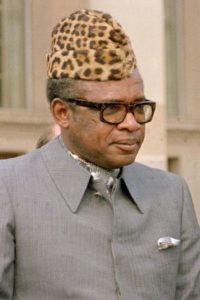
Mobutu Sese Seko
*Mobutu Sese Seko Kuku was born on this date in 1930. He was a Congolese politician and military officer.
Mobutu, a member of the Ngbandi ethnic group, was born in Lisala, Belgian Congo. Mobutu's mother, Marie Madeleine Yemo, was a hotel maid who fled to Lisala to escape the harem of a local village chief. There she met and married Albéric Gbemani, a cook for a Belgian judge. Shortly afterward, she gave birth to Mobutu. An uncle selected the name "Mobutu." Gbemani died when Mobutu was eight. Thereafter he was raised by an uncle and a grandfather.
The Belgian judge's wife took a liking to Mobutu. She taught him to speak, read, and write fluently in the French language, the official language of the country in the colonial period. His widowed mother, Yemo, relied on the help of relatives to support her four children, and the family moved often. Mobutu's earliest education occurred in the capital, Léopoldville (now Kinshasa). His mother eventually sent him to an uncle in Coquilhatville, where he attended the Christian Brothers School, a Catholic-mission boarding school. Mobutu found discipline in army life and a father figure in Sergeant Louis Bobozo.
As a soldier, Mobutu pseudonymously wrote about contemporary politics for Actualités Africaines (African News), a magazine set up by a Belgian colonial. In 1956, he quit the army and became a full-time journalist. Two years later, he went to Belgium to cover the 1958 World Exposition and stayed to receive training in journalism. By this time, Mobutu had met many young Congolese intellectuals challenging colonial rule. He became friendly with Patrice Lumumba and joined Lumumba's Movement National Congolais (MNC). Mobutu eventually became Lumumba's aide. Several contemporaries indicate that Belgian intelligence had recruited Mobutu to be an informer to the government.
During the Congo Crisis, Mobutu, serving as Chief of Staff of the Army and supported by Belgium and the United States, deposed the democratically elected government of Nationalist Patrice Lumumba in 1960. Mobutu installed a government that arranged for Lumumba's execution in 1961 and continued to lead the country's armed forces until he took power directly in a second coup in 1965. To consolidate his power, he established the Popular Movement of the Revolution as the sole legal political party in 1967, changed Congo's name to Zaire in 1971, and changed his name to Mobutu Sese Seko in 1972.
Mobutu claimed his political ideology was "neither left nor right, nor even center." Still, in practice, he developed an intensely autocratic regime, even by the African standards of his time. He attempted to purge the country of all colonial cultural influence through his program of "national authenticity". During his rule, he amassed a large personal fortune through economic exploitation and corruption, leading some to call his rule a "kleptocracy." He presided over widespread human rights violations. Under his rule, the nation also suffered from uncontrolled inflation, an immense debt, and massive currency devaluations.
He was married twice. He married his first wife in 1955. They had nine children. She died of heart failure in October 1977 at the age of 36. In 1980, he married his mistress on the eve of a visit by Pope John Paul II to legitimize his relationship in the eyes of the Church. Mobutu received strong support from the United States, France, and Belgium, who believed he was a strong opponent of communism in Francophone Africa. He also built close ties with the governments of Apartheid South Africa, Israel, and the Greek military junta.
From 1972 onwards, he was also supported by Mao Zedong of China. The massive Chinese economic aid that flowed into Zaire gave Mobutu more flexibility in his dealings with Western governments, allowed him to identify as an "anti-capitalist revolutionary," and enabled him to avoid going to the International Monetary Fund for assistance.
By 1990, economic deterioration and unrest led Mobutu to agree to share power with opposition leaders. Still, he used the army to thwart change until May 1997, when rebel forces overran the country and forced him into exile. Mobutu went into temporary exile in Togo; from May 1997, he lived mostly in Rabat, Morocco. Mobutu Sese Seko Kuku died on September 7, 1997. In December 2007, the National Assembly of the Democratic Republic of the Congo recommended returning his remains and interring them in a mausoleum in Zaire, which has not yet taken place. Mobutu remains interred in Morocco in an above-ground mausoleum at Rabat-Sale-Zemmour-Zaer, in the Christian cemetery known as Cimetière Européen. On the day Mobutu fled into exile, Laurent-Désiré Kabila became the new president of Congo. He was assassinated in 2001 and succeeded by his son Joseph Kabila.